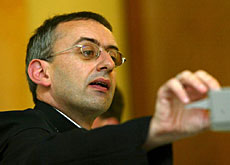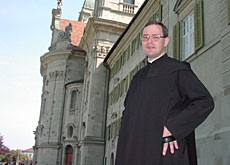Search for harmony leads the faithful astray

The abbot of the Swiss Benedictine Abbey of Einsiedeln, Martin Werlen, says Christmas remains a deeply dramatic experience despite its commercial aspect.
In an interview with swissinfo, Werlen criticised politicians and clergy who preach intolerance towards foreigners and other religions.
Werlen, who was appointed abbot of Einsiedeln (in canton Schwyz) two years ago, does not confine himself to questions of religion – he is perfectly at home discussing ethical, moral and social issues.
The 41-year-old intellectual – possessed of a fine sense of humour – also relishes debate and dialogue with disillusioned Christians as well as members of other religions.
He is less than enthusiastic about recent changes in Switzerland’s political landscape, following the rise of the rightwing Swiss People’s Party and the election of its populist figurehead, Christoph Blocher, to the cabinet.
swissinfo: Christmas has become very commercial to the extent that one could almost say we are living in a “loveless” era. How do you see it?
Martin Werlen: Christmas is still significant – it remains a holiday after all – but its meaning has certainly changed. I find the ‘romantic’ side of Christmas more difficult to accept than the commercial side. Christmas is anything but romantic.
Christmas celebrates the birth of Christ, which is a fantastic event: God came to earth and became man to save man. But, as it says in the gospel of John, humanity is not quite ready to accept this gift.
Edith Stein, a converted Jewish woman who died in Auschwitz in 1942, wrote: “Above the manger, one can already see the light shining on the cross.” I think that we have forgotten this – that Christmas essentially represents a dramatic experience.
Behind the exchange of gifts is a deeply Christian thought – love. And if we don’t share gifts out of love, we do it out of obligation, which is a calculating act.
swissinfo: Last summer you organised the first pilgrimage for people “at loggerheads with the church” as you called it. How do you feel about the situation today?
MW: The pilgrimage was enriching for all those involved. We have not yet arrived at where we want to be, but we are still on the path, so to speak– and that’s exciting. The Christian message is exciting – every single day I can relate to it when I have to ask someone for forgiveness.
The problem is that people normally do not want excitement in their lives because it causes tension. People are looking for harmony, and in this search for harmony many exciting things lose their attraction.
But tension is part of life – that was seen by those who joined us on the pilgrimage.
swissinfo: Many worshippers feel these tensions keenly and their discomfort with the hierarchy of the church or the messages coming from Rome have driven them away. What are your thoughts on this?
M.W: That is not a constructive way forward – to perceive tensions only in a negative way, and to allow them to drive one away from the church.
With our pilgrimage we found a forum to help teach people to deal constructively with the tension in their spiritual lives. But it also takes courage to question one’s own beliefs.
swissinfo: Where do you place the Catholic Church in Switzerland today, given that other religions are now a prominent part of the country’s religious landscape?
M.W.: The changes in Switzerland are associated with a number of different phenomena including, for example, immigration. I don’t see this as a threat. A Muslim has never kept me from being a Christian – quite the contrary in fact.
The exchange of ideas among different religions is very fruitful – it challenges us to be convinced about our beliefs.
Recently a Muslim leader here in Switzerland said that one of the biggest problems with inter-religious dialogue was that Christians do not have the courage to stand up for their own religious beliefs. I think that’s right.
We should not be afraid of other religions – what we should fear is becoming indifferent to our own.
swissinfo: Is it not the church’s job to rise to the challenge and ensure that people don’t fear Islam?
M.W.: There is intensive dialogue among theologians of the different religions. But you are right that people fear Islam. And to some extent the reason for that is because of fundamentalist groups and politicians who use these fears to their own advantage.
What can we do to ease people’s concerns? It’s important that people talk to and get to know others of different faiths. We have to confront these issues, but in a positive and patient manner.
When you hear, for example, of an attack by fundamentalists, it has the effect of re-inforcing such preconceptions. But radical groups, whether Christian or Islamic, are never the ‘exclusive’ face of a religion – only a distortion of it.
swissinfo: There are certain issues – such as the wearing of veils – which invariably lead to polemics. Is an appeal for tolerance enough to deal with these problems?
M.W.: The problem is that, when we speak of tolerance today, we often mean ‘indifference’ – that it doesn’t matter. I find it difficult to accept this kind of ‘tolerance’. Why would I be a Christian if nothing really matters?
Tolerance should not mean indifference, but respect for others’ religions. I can reject another opinion but I should never reject a person who has a different opinion.
swissinfo: The tone of the political debate in Switzerland has become more strident – politicians use terms like “bogus invalids” or “bogus asylum-seekers”. Do these terms worry you?
M.W.: It always worries me when people are portrayed not as human beings but as a danger to society. I think politicians particularly should work to counteract this tendency. A country cannot more forward when such negative and pessimistic views are pervasive.
Solidarity is becoming more and more important. Switzerland can no longer consider itself an island. Nowadays we are part of Europe and the rest of the world.
We all profit from countries and people – even here in Switzerland – who lack the basics in life. It is our responsibility to seek more justice in the world. And we won’t be able to do this if we simply close our borders and say ‘we’re doing fine’.
Politicians who ignore these issues may enjoy some success in the short term, but it won’t work in the long run.
swissinfo: Why do you think the Christian Democratic Party – whose roots are in the Catholic tradition – has been losing so much ground in Switzerland in recent years?
M.W.: The political landscape in the past few months has been dominated by one figure [Christoph Blocher]. There has been virtually no debate about values, perspectives or how to deal with the issues that concern people most.
A political party – no matter what it colour – has to take a position on such issues, and I think that’s where the Christian Democrats went wrong.
I have no ties to any political party – I support values which I believe are fundamental to being Swiss. These have to do with being open to other people – outsiders – and this is something that has shaped Switzerland in the past and is shaping Switzerland today.
swissinfo-interview: Rita Emch and Ariane Gigon Borman (translation: Karin Kamp)
Martin Werlen became abbot of the abbey at Einsiedeln in November 2001.
Born in 1962, the Benedictine monk is one of the youngest abbots in the abbey’s history.
Werlen took his vows in 1984 and became a priest in 1988. He is a theologian, psychologist and teacher.
About 86 Benedictine monks live in the monastery. Some 30 nuns live in the Fahr convent, which Werlen also heads.
Einsiedeln is the world’s only “double” abbey.

In compliance with the JTI standards
More: SWI swissinfo.ch certified by the Journalism Trust Initiative










You can find an overview of ongoing debates with our journalists here . Please join us!
If you want to start a conversation about a topic raised in this article or want to report factual errors, email us at english@swissinfo.ch.